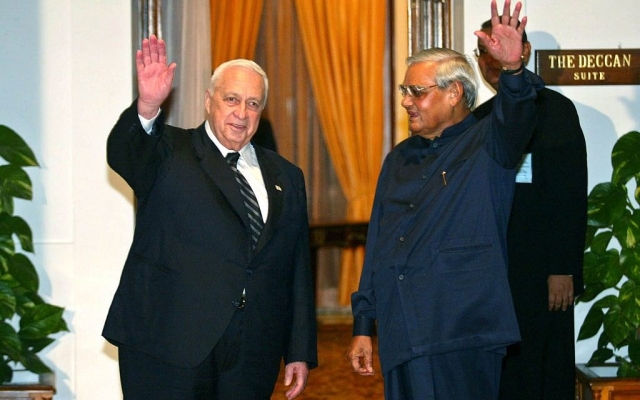On this momentous day in Israel's history, September 8, 2003, marked an unprecedented milestone as Prime Minister Ariel Sharon landed in New Delhi for a groundbreaking three-day diplomatic sojourn. This seminal visit was not just the first of its kind by an Israeli premier to India, but it also served as a conspicuous affirmation of the growing partnership between Israel and India—a relationship that has seen a tectonic shift since its formal inception in 1992.
Mr. Sharon's delegation was no ordinary group; it was a high-powered ensemble comprising key cabinet ministers and leading figures from Israel's defense industry. The gravity of this assembly emphasized the significance both nations placed on mutual cooperation, particularly in the realms of security and defense.
India, which had historically been an ardent advocate of the Palestinian cause, initiated diplomatic relations with Israel in 1992. The relationship experienced a metamorphosis after a Hindu-nationalist government ascended to power in 1997, paving the way for more harmonious interactions. While India's shift could be seen as pragmatic in the ever-changing geopolitical landscape, it also underscored a new alignment based on shared concerns and mutual interests.
Ezer Weizman became the first Israeli President to visit India in 1997. In 2003, Ariel Sharon was the first Israeli Prime Minister to visit India. #IndiaIsraelAt30 pic.twitter.com/jheMvIqK43
— Anushree 🇮🇳 (@AnushreeSays_) January 29, 2022
At the core of this burgeoning relationship were defense and security collaborations. Israel has ascended the ranks to become India's second-largest arms supplier, trailing only behind Russia. Both nations, beleaguered by the challenges posed by Islamic terrorism, found common ground for intelligence sharing and mutual defense. Brahma Chellany, a distinguished foreign policy analyst at New Delhi's Center for Policy Research, elucidated that "the cooperation between India and Israel now spans multiple strategic spheres. There is an intelligence exchange, training of Indian special forces in counter-terrorism techniques by Israeli experts, and collaborative initiatives in missile defense and unmanned aerial vehicle technology."
Beyond the defense corridor, the relationship has diversified into a robust economic partnership. Various sectors, ranging from healthcare and agriculture to technological innovations, have seen mutual investments and trade activities. In fact, since Mr. Sharon's visit, India's merchandise exports to Israel have surged to an impressive $7.89 billion, while Israeli exports to India reached an estimated $2.13 billion in 2022. Additionally, bilateral trade in services has been appraised at $1.1 billion, as per estimates from India's foreign ministry.
ANI ARCHIVES (September 9, 2003), #WATCH: Former PM Atal Bihari Vajpayee and then Israeli PM Ariel Sharon on India-Israel relations pic.twitter.com/c1bOuMplXe
— ANI (@ANI) July 3, 2017
During the pivotal 2003 visit, several agreements were inked, extending the cooperation into areas beyond defense and security. The scope of these accords covered a plethora of issues, such as combatting drug smuggling, environmental protection, and even fostering cultural exchanges.
While in India, Mr. Sharon made it a point to meet prominent Indian business leaders, solidifying the commercial linkages between the two nations. He also spent a day touring Mumbai, India's commercial capital, further cementing economic and social ties.
September 8, 2003: @IsraeliPM Ariel Sharon traveled to India, for the first ever visit there by a sitting Israeli Prime Minister. He was welcomed by Indian Prime Minister Atal Behari Vajpayee.
— Today in Israel's History (@TodayIsrael) September 8, 2020
Israel and India established diplomatic relations in 1992. pic.twitter.com/o94zWw9j13
In retrospect, Ariel Sharon's 2003 visit was not just a historic diplomatic event, but a harbinger of the multi-faceted alliance that India and Israel have cultivated. The relationship has since evolved into an indispensable partnership for both nations, with each contributing uniquely to the prosperity and security of the other. It is a connection that goes beyond mere transactional interactions, anchoring itself in shared values, common threats, and mutual aspirations.


